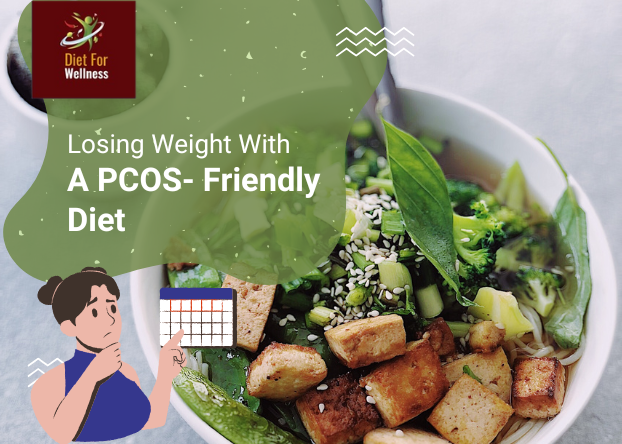Losing Weight With A PCOS- Friendly Diet

Dietary and lifestyle adjustments, particularly increasing high-fiber foods and lean protein while reducing refined carbohydrates and sugary items, can be a powerful tool for many individuals with PCOS to manage their symptoms.
PCOS is characterized by irregular or absent periods and often involves multiple ovarian cysts due to elevated androgen levels. Research from 2019 indicates that a significant portion (33% to 83%) of people with PCOS also experience overweight or obesity.
Without proper management, PCOS can increase the risk of conditions like heart disease, endometrial cancer, diabetes, and high blood pressure. Fortunately, many find that proactive changes in diet and lifestyle can effectively manage PCOS symptoms and mitigate these potential health risks.
Effect of Diet on PCOS
Diet significantly influences PCOS, often due to its impact on insulin levels. Individuals with PCOS frequently exhibit higher-than-normal insulin. Insulin, a pancreatic hormone, facilitates glucose conversion into energy.
Insufficient insulin production or insulin resistance (ineffective insulin use) can lead to elevated blood sugar. In response to insulin resistance, the body may produce excess insulin, prompting the ovaries to produce more androgens like testosterone. Higher body mass index can also contribute to insulin resistance, which can hinder weight loss, a common challenge for those with PCOS.
Consuming a diet rich in refined carbohydrates (starchy and sugary foods) can exacerbate insulin resistance and complicate weight management.
Foods to Include in PCOS Diet
To support your PCOS diet, focus on incorporating more high-fiber foods. These help manage insulin resistance by slowing digestion and lessening the impact of sugar on your blood. Good sources include cruciferous vegetables (broccoli, cauliflower, Brussels sprouts), leafy greens (red-leaf lettuce, arugula), green and red peppers, beans and lentils, almonds, berries, sweet potatoes, winter squash, and pumpkin.
While lean proteins like tofu, chicken, and fish don’t offer fiber, they are filling and nutritious additions. Also, consider adding anti-inflammatory foods such as tomatoes, kale, spinach, almonds, walnuts, olive oil, fruits like blueberries and strawberries, and omega-3-rich fatty fish like salmon and sardines.
Foods to Avoid
To manage PCOS effectively, significantly limit or avoid refined carbohydrates, as they can increase inflammation and worsen insulin resistance. This category includes highly processed foods like white bread, muffins, breakfast pastries, sugary desserts, and anything made with white flour. Traditional pasta, where semolina, durum flour, or durum wheat flour are the primary ingredients, is also high in carbohydrates and low in fiber. Consider nutritious alternatives made from bean or lentil flour.
Sugar, a carbohydrate, should also be restricted in a PCOS diet. When checking food labels, be aware of various names for sugar, such as sucrose, high fructose corn syrup, and dextrose. Reduce your intake of sugary drinks like soda and juice, as well as inflammatory foods like fries, margarine, and red or processed meats. It’s always best to consult a healthcare professional for personalized dietary recommendations before making significant changes.
Lifestyle Changes that Are Required
Beyond diet, several lifestyle adjustments can significantly improve PCOS symptoms. Incorporating regular exercise and daily physical activity, especially when combined with limiting refined carbohydrates, can be effective in reducing insulin resistance.
Experts often recommend aiming for at least 150 minutes of exercise per week. Furthermore, consistent daily activity, a diet low in sugar, and one that minimizes inflammation may contribute to weight loss, which in turn can improve ovulation for some individuals.
Given that PCOS symptoms can be a source of stress, practicing stress reduction techniques like yoga and meditation, which promote mental calm and body awareness, can be beneficial. Finally, seeking support from a therapist or other healthcare professional can also be a valuable part of managing PCOS.
Conclusion
Adopting a PCOS-friendly diet and incorporating certain lifestyle adjustments can be empowering steps towards improving your mood and alleviating some of the common symptoms associated with PCOS. While some foods may be best limited or avoided on this dietary approach, there are often nutritious and beneficial alternatives available. For instance, swapping margarine and white toast for high-fiber whole-grain bread with olive oil or avocado can be a positive change.
If your PCOS symptoms continue, taking guidance from a healthcare professional is important for identifying the underlying cause and determining the most appropriate next steps for your individual needs.
